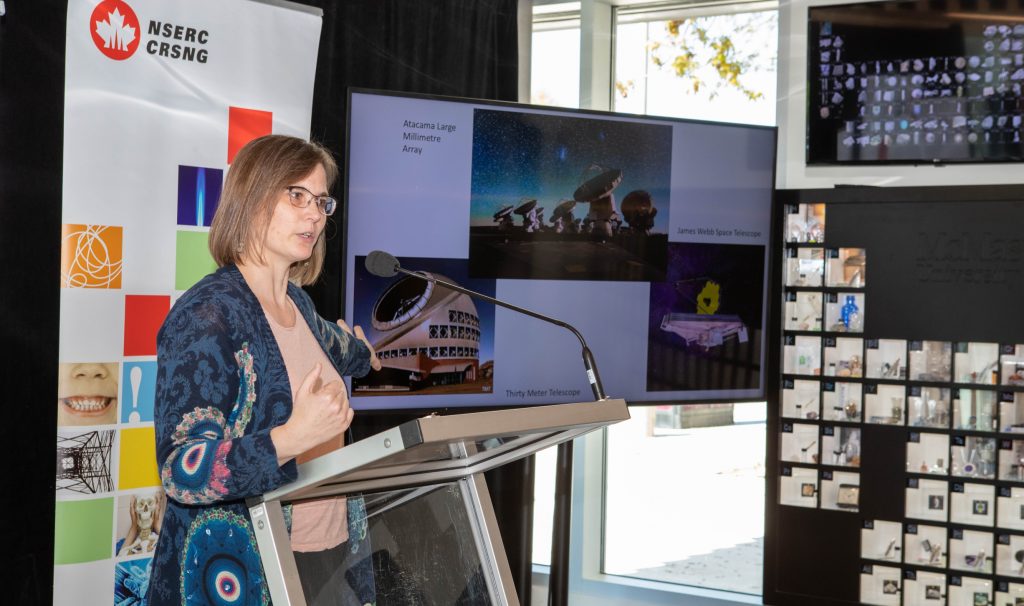McMaster science and engineering researchers receive $17.8 million in federal funding

Why fund astronomy research? "Because curiosity is what makes us human. It’s what leads us to make a better world." Physics and astronomy professor Alison Sills spoke about her work at the announcement of $588 million in NSERC Discovery Grants. (Photo by Georgia Kirkos, McMaster University)
The federal government is investing $17.8 million in McMaster, and more than half a billion dollars across Canada, to support science and engineering research.
Science and Sport Minister Kirsty Duncan announced the $588 million investment in the Natural Sciences and Engineering Research Council of Canada (NSERC) Discovery Grants program Tuesday in McMaster’s newly renovated Arthur Bourns Building.
The new grants will support more than 4,850 researchers and students across the country. The investment includes $6.2 million in Discovery Launch Supplements for 499 early-career researchers in the first year of their Discovery Grants.
“These awards are at the very core of our research enterprise,” McMaster President Patrick Deane said at the announcement, congratulating all of McMaster’s Discovery Grant recipients. “They afford our faculty the opportunity to pursue long-term projects and breakthrough discoveries, while training teams of students along the way.”
The funding demonstrates the government’s enduring commitment to science and researchers, Duncan said, describing how high-calibre researchers will bring new voices and new insights to their fields.
“I look forward to seeing the results of their work, as they make the world a better place and secure a brighter future for Canadians.”
Physics and astronomy professor Alison Sills, a Discovery Grant awardee who is one of six Mac researchers to get an additional $120,000 Discovery Accelerator Supplement, spoke about the need for fundamental science and engineering research, which is sometimes a hard sell.
“People say, “Why should we fund your research? You’re an astronomer,’ ” said Sills, who studies the evolution and behaviour of stars and star clusters, tracing their formation over billions of years.
“And the answer is: Because curiosity is what makes us human. It’s what leads us to make a better world.”
Earlier in the day, Duncan and Deane signed the Dimensions Charter, promoting equity, diversity and inclusion in research.
Equity, Diversity and Inclusion are critical for upholding Canada’s standing as a leader in international research. Thank you to @McMasterU President Patrick Dean for signing the Dimensions Charter. pic.twitter.com/3jxDp6YONZ
— Kirsty Duncan (@KirstyDuncanMP) May 21, 2019
Six McMaster researchers are getting the Discovery Accelerator Supplement, an additional $120,000 over three years awarded to Discovery Grant recipients who have a well-established research program and who show strong potential to become international leaders in their respective areas of research. They are:
- Younggy Kim (Engineering)
- Maureen Lagos (Engineering)
- Ralph Pudritz (Science)
- Alison Sills (Science)
- Hao Yang (Engineering)
- Rong Zheng (Engineering)
These McMaster researchers have been awarded the Discovery Launch Supplement, a new one-year supplement of $12,500 for early-career researchers:
- Hassan Ashitani (Engineering)
- Georgios Balomenos (Engineering)
- Drew Higgins (Engineering)
- Mohamed Hussein (Engineering)
- Maureen Lagos (Engineering)
- SeonHong Na (Engineering)
- Amin Reza Rajabzadeh (Engineering)
- Angela Scott (Health Sciences)
- Hao Yang (Engineering)
- Benzhong Zhao (Engineering)
- Yun Zhou (Business)

